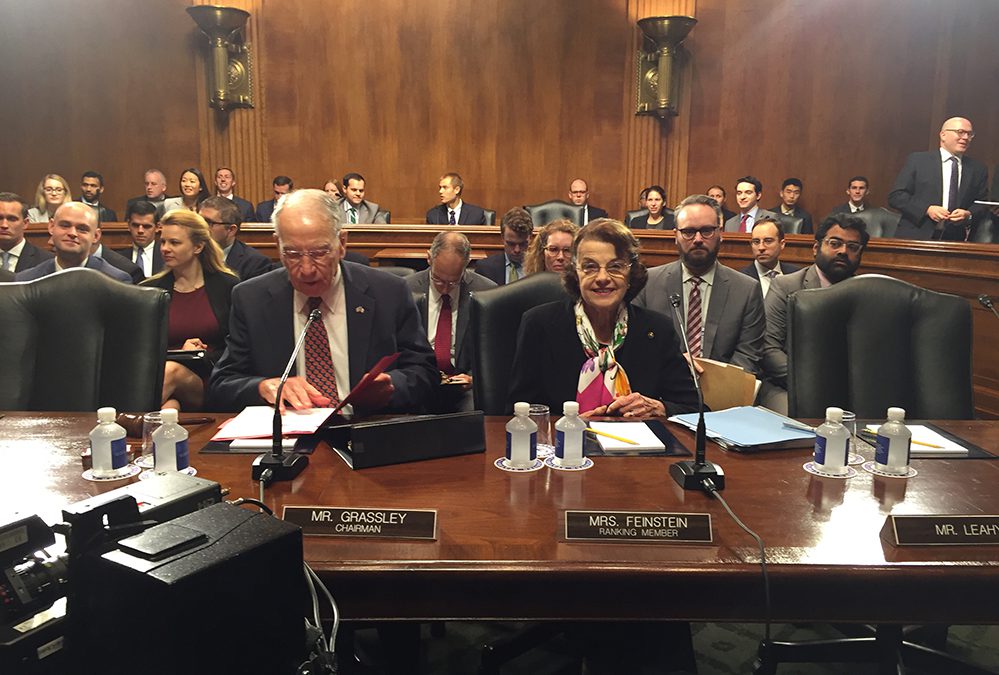WASHINGTON — Gone was the rancor broadcast during the battle over the confirmation of Brett Kavanaugh to the Supreme Court. Thursday’s business meeting of the Senate Judiciary Committee was collegial and bipartisan — to a point.
The agenda for the meeting included consideration of nine judicial nominees to various positions within the federal judiciary and two bills.
The committee easily approved a bill that would deny entry to the U.S. to foreign nationals who have been deemed to interfere in U.S. elections and another measure that would make lynching a federal crime.
But Sen. Chuck Grassley. R-Iowa, read a prepared statement regarding the nominee to the 8th U.S. Circuit Court of Appeals, Jonathan Kobes. This circuit includes North and South Dakota, Nebraska, Minnesota, Iowa, Missouri and Arkansas. Kobes works as general counsel for South Dakota U.S. Sen. Mike Rounds. A native Iowan, he once worked as an intern in Grassley’s office.
Kobes has no judicial experience except as a law clerk.
Grassley’s statement blasted the American Bar Association for “politicizing” Kobes’ nomination by rating him “not qualified.” He speculated that Kobes’ low rating stemmed from his involvement in abortion litigation. A 2018 appointee, L. Steven Grasz of Omaha, now on the 8th Circuit, was also rated “not qualified” by the ABA. Grassley labeled the evaluator who assigned the ratings a liberal activist who has frequently criticized of conservative judges and their philosophies.
“In short, the experience of Judge Grasz and Mr. Kobes demonstrates, a Republican nominee to the Eighth Circuit can’t expect a fair shake,” Grassley complained.
However, Grassley did acknowledge that the ABA report called Kobes “very accomplished, competent and capable” and did not question his integrity or judicial temperament.
According to Grassley’s statement, the ABA had “difficulty analyzing Mr. Kobes’ professional competence because he was unable to provide sufficient writing samples of the caliber required to satisfy committee members that he was capable of doing the work of a United States circuit court judge.”
But the top Democrat on the committee, California Sen. Diane Feinstein, reminded the senators at the hearing that the ABA has been reviewing judicial nominees since 1953. During the Obama administration, no nominee received a rating of “not qualified,” but during the first two years of the Trump administration, six nominees have had that rating.
According to Feinstein, a substantial majority of the ABA evaluators voting on Kobes’ evaluation found that “none of his writings were reflective of complex legal analysis, knowledge of the law, or ability to write about complex matters in a clear and cogent manner.”
“This should really be concerning to all of us,” Feinstein said. “A lack of basic experience and qualifications is not- or should not be a partisan issue. We should all want the best and the brightest for our federal courts, especially the circuit courts.”
The committee voted along party lines, 11-10, to approve Kobes’ nomination for a full Senate vote.
Sen. Mazie Hirono, D-Hawaii, predicted that Kobes likely would be confirmed by the Senate on a straight party-line vote, She said that Kobes’ history of “anti-choice” activism twould make it “impossible for him to fairly decide cases involving reproductive rights.”
Hirono said that Kobes voluntarily represented crisis pregnancy centers seeking to uphold a South Dakota law requiring doctors to inform women seeking abortions that “the pregnant woman has an existing relationship with that unborn human being and that the relationship enjoys protection under the United States Constitution and under the laws of South Dakota.”
“This is an unacceptable level of political bias to bring to the 8th Circuit,” Hirono said.
The other nominees were all for positions as district judge. They were Kenneth D. Bell of North Carolina and Carl J. Nichols of the District of Columbia, approved on party line votes; Stephanie A. Gallagher of Maryland was approved 20 – 1; Mary S. McElroy of Rhode Island, approved 19 – 2; Martha Maria Pacold of Illinois, approved 18-3; Mary M. Rowland of Illinois, approved 16-5; and Steven C. Seeger of Illinois, approved by a voice vote. The nomination of John M. O’Connor of Oklahoma was held over for a week.

